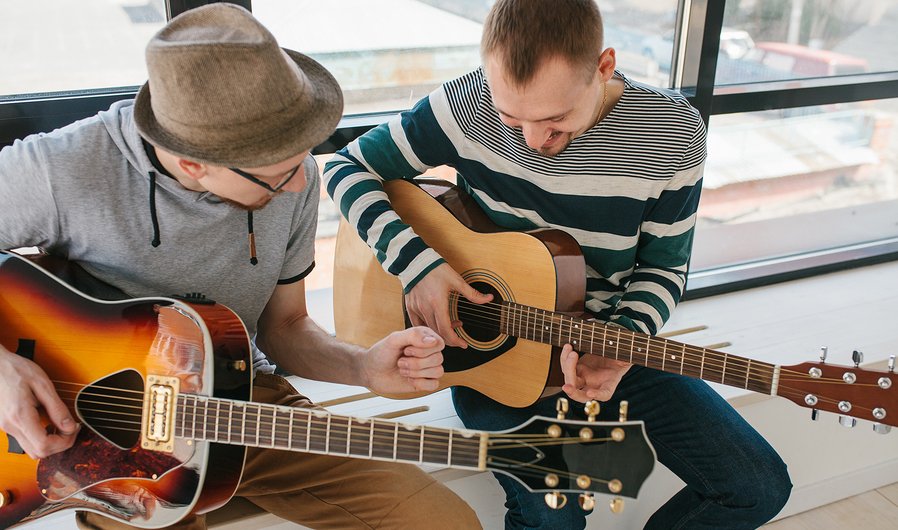Hobbies are a healthy way to spend some of your leisure time, and picking up new motor skills is good for your brain. So if you’ve always wanted to learn calligraphy, take up an instrument, start knitting sweaters, or try your hand at building model airplanes, you should go for it. But here’s a surprising tip: you might want to have a quick exercise session after you practice your newly chosen activity, because new research suggests that could help you get the hang of it more easily.
The study, which took place at McGill University in Montreal, Canada, found that performing cardiovascular exercise immediately after working on developing a motor skill helps you improve your ability and retain it better in the long term.1 Dal Maso, Fabien; et al. “Acute cardiovascular exercise promotes functional changes in cortico-motor networks during the early stages of motor memory consolidation.” NeuroImage. July 2018. Accessed 18 July 2018. http://www.sciencedirect.com/science/article/pii/S1053811918302398?via%3Dihub.
These results are based on an investigation that measured brain activity using electroencephalography (EEG) and muscle data using electromyography (EMG) on men and women who were given a series of tasks to perform.
Their first assignment was a pinch task, which involved holding a dynamometer, a controller similar to a joystick used for video games. The subjects were told to use the dynamometer to move a cursor up and down, connecting red rectangles as quickly as they could on a computer monitor. To achieve the desired results, they had to vary the pressure they applied to the dynamometer, and this made it a good activity for evaluating motor learning capabilities.
Once the pinch task was complete, the participants were randomly selected for 15 minutes of either physical activity or rest. Following this break, the volunteers were given a variation of the first task to perform, called a handgrip task. For this version, they used degrees of force similar to those that they had used to control the dynamometer during the pinch task and the investigators analyzed their brain activity. This was repeated 30, 60, and 90 minutes after the interlude of aerobic exercise or rest.
Finally, the original pinch task was performed again by all of the subjects eight hours and 24 hours after their initial attempt at it. Once again, the researchers measured their brain and muscle activity to determine the strength of the motor memories over a longer period of time.
After comparing the brain activity levels at each stage of the process, the investigators found that those in the group who had exercised after their first pinch task were consistently better at repeating the movements required to successfully complete the task. And retention of the skill appears to have maximized at the 24-hour mark, with the most substantial difference shown at that point between the groups. What’s more, the exercisers were able to achieve this level of performance more efficiently, requiring less brain activity compared to their peers who had rested.
A reduction in brain activity is a positive in this case, since it appears that the physical activity had helped strengthen the neural connections within and across the hemispheres of the brain, making it more efficient. These types of improved pathways are helpful because they leave more of the brain’s connections available for other activities.
Interestingly, the retention of the motor skills was much less pronounced for all of the tasks shortly after the original test and even at the eight-hour point. It was only after 24 hours that a major jump in retention occurred, which could mean that sleep—but at the right point in the process—is another important component in how we can successfully develop and retain new motor skills.
At any rate, we are well aware of how valuable exercise is for our bodies, and this research offers evidence of just how good it is for our brains as well. It builds on earlier findings, such as a 2010 study at the University of Illinois at Urbana-Champaign that showed cardiovascular workouts improve brain circuitry and may even reverse some age-related declines in brain function.2 Voss, Michelle W.; et al. “Plasticity of brain networks in a randomized intervention trial of exercise training in older adults.” Frontiers in Aging Neuroscience. 26 August 2010. Accessed 19 July 2018. http://www.frontiersin.org/articles/10.3389/fnagi.2010.00032/full. And in the case of the current research, it is nice to know that even just a little exercise can go a long way toward helping us keep our brains vital and healthy—in addition to helping us master our new hobby.
References
| ↑1 | Dal Maso, Fabien; et al. “Acute cardiovascular exercise promotes functional changes in cortico-motor networks during the early stages of motor memory consolidation.” NeuroImage. July 2018. Accessed 18 July 2018. http://www.sciencedirect.com/science/article/pii/S1053811918302398?via%3Dihub. |
|---|---|
| ↑2 | Voss, Michelle W.; et al. “Plasticity of brain networks in a randomized intervention trial of exercise training in older adults.” Frontiers in Aging Neuroscience. 26 August 2010. Accessed 19 July 2018. http://www.frontiersin.org/articles/10.3389/fnagi.2010.00032/full. |











